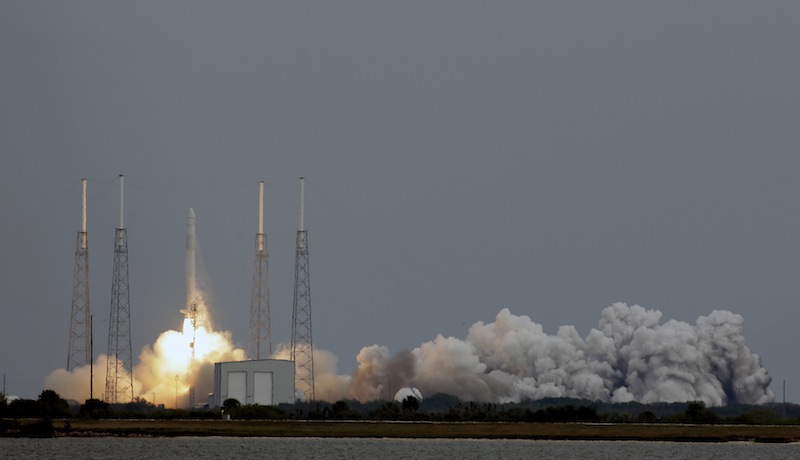By MARCIA DUNN, AP Aerospace Writer
CAPE CANAVERAL, Fla. (AP) — A commercial cargo ship rocketed toward the International Space Station on Friday under a billion-dollar contract with NASA that could lead to astronaut rides in just a few years.
SpaceX, a private California company run by the billionaire who helped create PayPal, launched its unmanned Falcon rocket into clouds right on time. It is the third supply run by a Dragon capsule, an unparalleled accomplishment all under a year.
Launch controllers applauded and gave high-fives to one another, once the spacecraft safely reached orbit. The successful separation of the Dragon from the rocket was broadcast live on NASA TV; on-board cameras provided the unique views nine minutes into the flight.
The space station and its six-man crew were orbiting 250 miles above the Atlantic, just off the New England coast, when the Falcon soared. The Dragon spacecraft is due to arrive Saturday morning after an unusually short chase; astronauts will use a hefty robot arm to draw the Dragon in and dock it to the station.
SpaceX tucked fresh fruit into the Dragon for the station residents; the apples and other treats are straight from the orchard of an employee’s family. There wasn’t room in the research freezers for the usual ice cream cups.
Also on board: 640 seeds of a flowering weed used for research, mouse stems cells, protein crystals, astronaut meals and clothing, trash bags, air-purifying devices, computer parts and other gear.
SpaceX — formally Space Exploration Technologies Corp. — has a $1.6 billion contract with NASA for space station shipments. Its founder, Elon Musk, monitored the launch from the company’s Mission Control and home office in Hawthorne.
NASA’s deputy administrator, Lori Garver, said using commercial providers is more efficient for the space agency. It’s part of a long-term program, she noted, that has NASA spending less money on low-Earth orbit and investing more in deep-space missions. That’s one reason why the space shuttles were retired in 2011 after the station was completed.
The goal is to have SpaceX and other private firms take over the job of ferrying astronauts to and from the space station in the next few years.
SpaceX — so far the leader of the pack — is aiming for a manned Dragon flight by 2015.
“Go Falcon 9, go Dragon,” Garver urged before the launch.
This is the second in a planned series of 12 SpaceX deliveries under the contract with NASA; the first was last October. A company-sponsored demo mission kicked everything off last May.
Competitor Orbital Sciences Corp. has yet to get off its Virginia launch pad. The company plans to launch a free-flying test of its Antares rocket and Cygnus supply ship in April, followed by a demo run to the space station in early summer. Then the so-called operational supply runs can begin.
Russia, Japan and Europe regularly make station deliveries as well, and Russia is the only option for astronaut rides. But only the Dragon is designed to bring back substantial amounts of research and used merchandise.
This Dragon will spend more than three weeks at the space station before being cut loose by the crew on March 25. It will parachute into the Pacific with more than a ton of medical samples, plant and cell specimens, Japanese fish and old machinery, and used spacewalking gloves and other items.
SpaceX plans to launch its next Dragon to the station in late fall.
More than 2,000 guests jammed the Cape Canaveral launch site Friday morning to watch the Falcon take flight.






